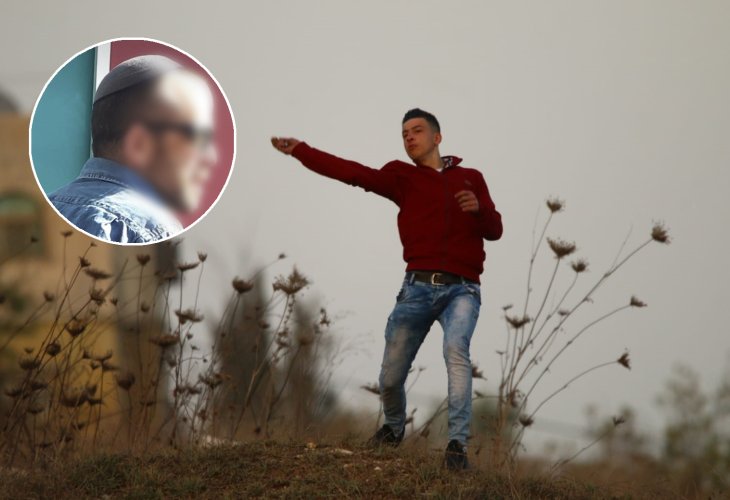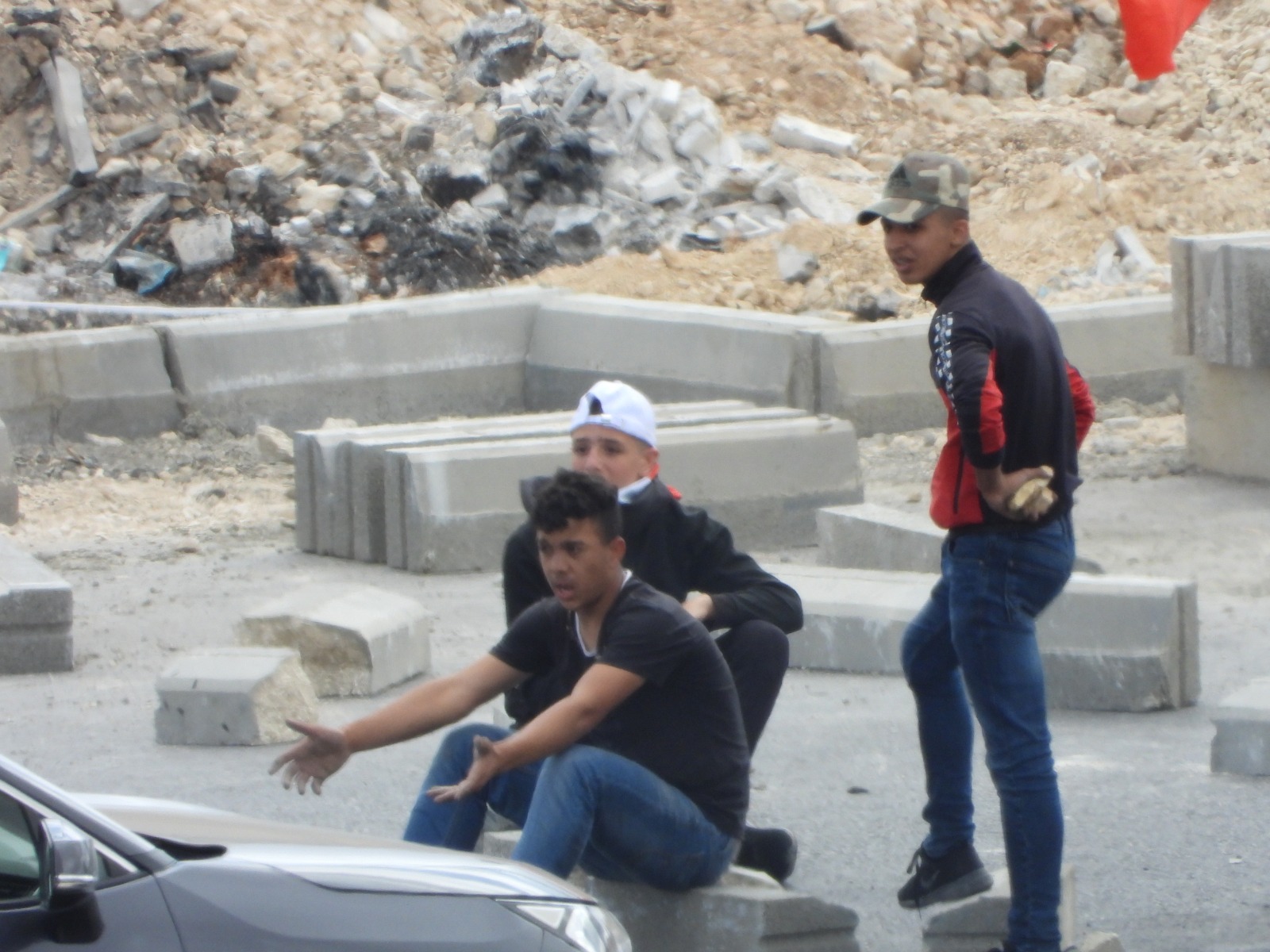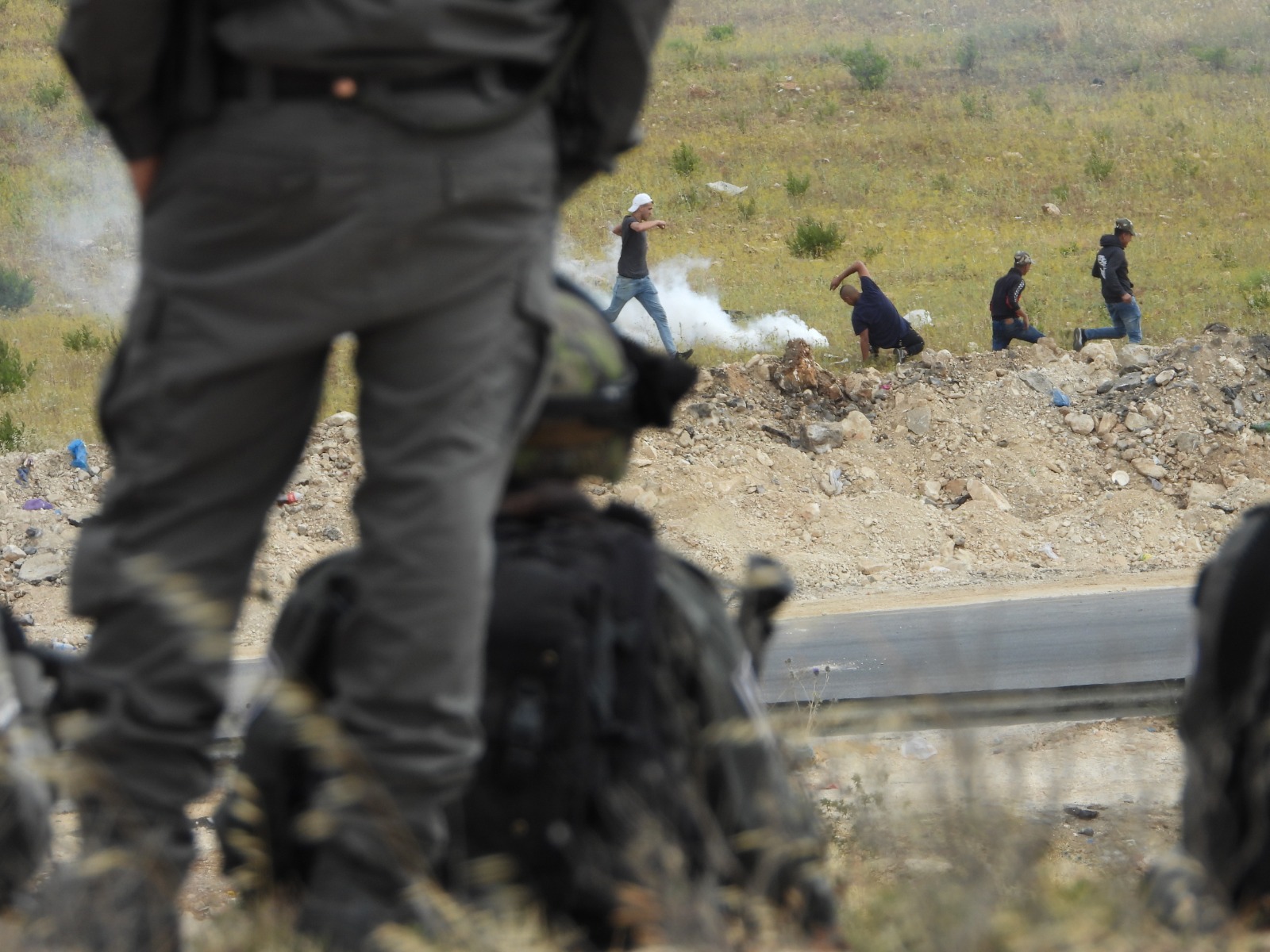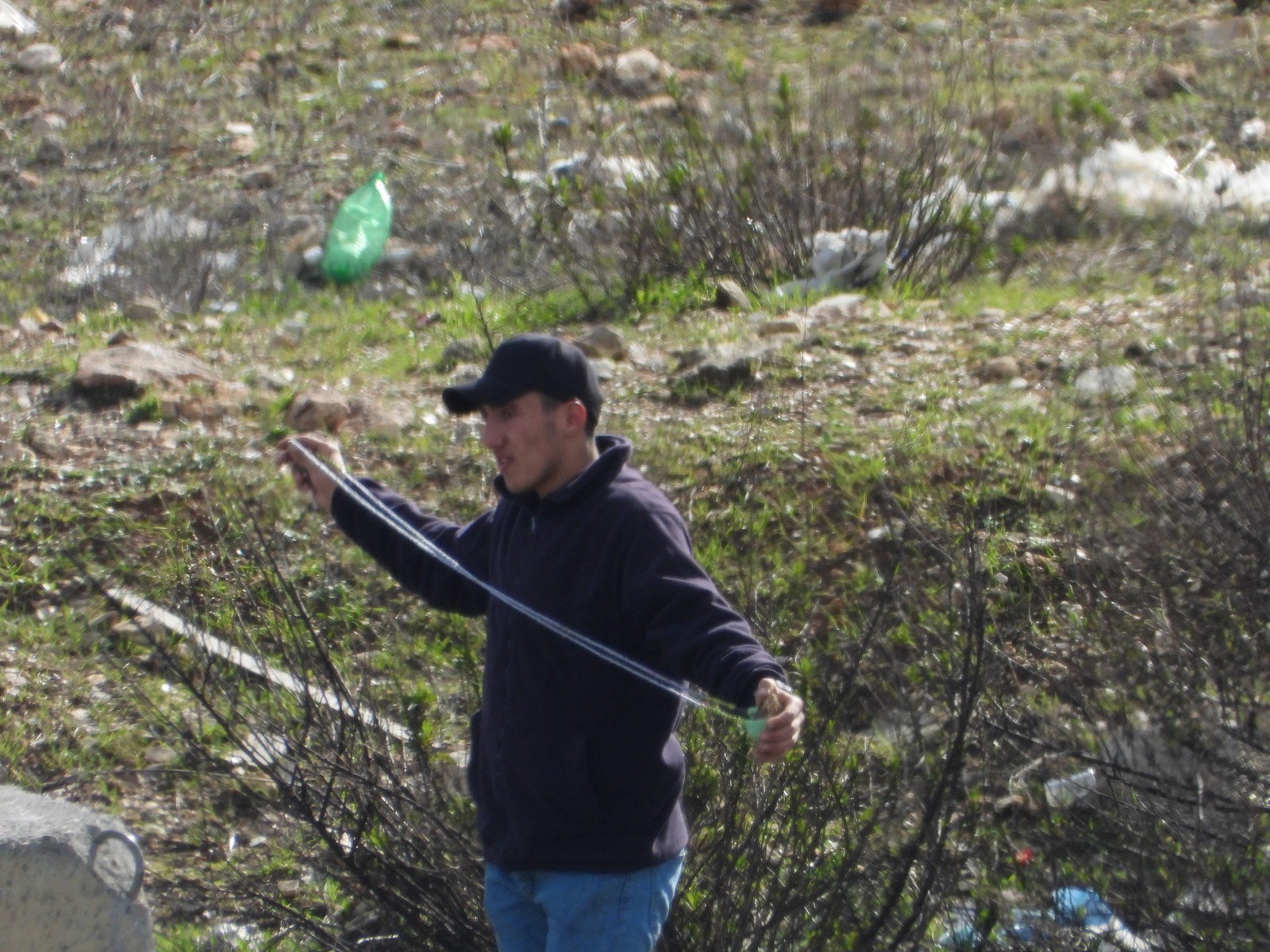Mysterious and Fascinating: 'We Track the Palestinians, and Here's How We Incriminate Them'
Private investigator Ari Kaniel, who used to work in national security and the police, now runs a unique project documenting Palestinians during riots, helping implicate them. What are his thoughts on the recent disturbances at Damascus Gate?
 (In the circle: Ari Kaniel)
(In the circle: Ari Kaniel)"You'll need to blur my picture on the website," private investigator Ari Kaniel warns me as we begin our conversation. "I also want to see the article before it's published," he adds, "and it's important for me to ensure that the images in it are only those the army approved for release."
Kaniel is careful with his words, something that's evident from the very first moment, choosing and weighing them meticulously. Having worked for years in the Ministry of Defense and the police, he's well aware of the power of words, their strength, and how they can determine fates.
Nowadays, he no longer works with the police but runs a private investigation firm and is considered one of the few religious private investigators in the country. He also manages a store for advanced surveillance equipment, offering recommendations from his extensive experience for various issues.
In addition to all this, Kaniel has a project close to his heart, which he's been overseeing for the past four years called 'Eye for Zion'. As part of this, he documents Palestinians alongside other activists during riots in various locations in Judea and Samaria, throwing stones, Molotov cocktails, and tires at soldiers.
"Just like what's happening these days at Damascus Gate," he adds, "only here in Judea and Samaria, it's already become routine. Usually, there are the typical Friday riots, but we often encounter them throughout the week."
Life Turned Upside Down
Kaniel has lived in Judea and Samaria since the day he was born. "I'm originally from Neve Tzuf and currently live in the settlement of Eli," he recounts. "The truth is, as a child of the '80s, I grew up in a completely different reality before the Intifada. We had normal and good neighborly relations with the Arabs in nearby villages, including a situation I remember when I was in third grade and my brother in second grade; we drove with one of our good friends from Deir Nizar village to play football, leaving a note to our parents saying 'We've gone to play soccer in the village and will return in the evening'. Needless to say, this message didn't cause our parents to faint or call in the special forces. We spent the afternoon in the village, our friend's father bought us a drink and chocolate bar marked kosher, and everything was fine. The extreme change came after the Oslo Accords, and since then our lives have turned upside down.
"Following the Oslo Accords, the status of the PLO was strengthened, an organization that sees itself as a terrorist faction aiming to expel all of Israel's people from the river to the sea. They haven't changed this ideology to this day and have no intention to do so. Concurrently, extreme leftists began infiltrating the surrounding villages, persistently stirring up tensions. If until then, teenagers from the Jewish settlements could spend time with those from the villages at the nearby spring, suddenly leftists clarified to the Arab villagers that the spring belonged to them and Jews were conquering it. This sparked riots in most areas of the sector, and they continue to this day."
 (Photo documentation by Ari Kaniel given to the security forces)
(Photo documentation by Ari Kaniel given to the security forces)Kaniel, who has accompanied the security system for many years, is confident that a major part of the issue that developed relates to the lenient approach of the security forces towards Arab rioters.
"We've all heard," he notes, "that at the start of this last week, the barricades at Damascus Gate were dismantled. It's so absurd because, from the Palestinians' perspective, this directly leads to the feeling that, behold, they've won their struggle. For them, it's like filling another tank with fuel to continue rioting, and it doesn't seem like they plan on stopping anytime soon. It reminds me of the incident with the metal detectors a few years ago. As we recall, back then, the idea arose to place metal detectors at the entrance to the Temple Mount to prevent terrorists from entering with weapons and killing officers and civilians. In response, riots began in the Arab sector, and the state 'bowed' to achieve immediate calm. So, yes, it seemed at that moment that it maybe won the small battle, but from a long-term perspective – it's clear it lost the war.
"Overall, it seems the security forces don't understand the Arabic language. The best analogy I have for what's going on here is from my time as a detective team leader in Jaffa and South Tel Aviv with the Israel Police. Among other things, I was part of the enforcement forces overseeing Bloomfield Stadium. I remember one of the clear instructions we received before every football game was to assume that after the match, the losing team would likely go wild outside, and our goal was to allow them to release pressure and direct them towards the cars. Unfortunately, the security system treats these terrorists’ riots as if they were football games, only forgetting that in their case, it involves throwing stones and Molotov cocktails, which can kill and injure. The fact that the military treats them like soccer fans proves the absurdity. It shows just how the security forces don’t really know how to respond properly."
 (Photo documentation by Ari Kaniel given to the security forces)
(Photo documentation by Ari Kaniel given to the security forces)And maybe the security forces simply believe the way to curb the rioters is through moderation?
"Right, they might assume that, and that's exactly the problem. Israel's lenient approach stems from a lack of understanding of the 'Arabic language'. Our leaders try to adhere to a European mentality, where restraint equals strength, meaning – I hold a fleet of fighter jets and divisions of tanks and don't use them, sending the message to the other side – 'I can destroy you at any moment and choose not to, so beware', and indeed, if we were dealing with a European country, we might calm the flames this way. But here, it's not about a European mentality, but an Arab one, where there is a need for an immediate and clear response; that's the mistake in the entire campaign, in my opinion."
Track and Document
Kaniel not only talks but also acts. "As a private investigator, I set for myself a primary goal in life to understand each situation deeply and know the truth. This applies in my daily work with clients but also affects the broader sense. This led me to oversee the 'Eye for Zion' project in recent years, assisting the military and police by providing them with footage of Palestinians rioting, effectively 'forcing' them to arrest these lawbreakers.
"When we started the project," Kaniel shares, "we held a special fundraiser and raised donations from the public, which we used to purchase high-quality zoom cameras. I personally brought my private equipment from home, and other volunteers did the same. We distributed the equipment in the field, placing volunteers in different areas from south of Mount Hebron to Nablus. We conducted this regularly on Fridays, but also on additional days during the week, especially where there are more riots and less enforcement. We began documenting the rioters with the cameras and discovered something interesting – events repeat on the same days and at the same times, as dozens and hundreds of rioters assault IDF soldiers and main roads, attempting to murder soldiers and civilians.
"Alongside our footage, we also 'dug' into social networks and discovered that the faces of these terrorists reappeared repeatedly. They usually carry out these riots openly, without any fear, because they know they're treated with kid gloves. Our goal is not only to document but also to capture incriminating images, while they're throwing stones, unmasked. Once we have such photos, we pass them to the security forces, and sometimes also distribute them in the media, to pressure the security system to make arrests."
 (Photo documentation by Ari Kaniel given to the security forces)
(Photo documentation by Ari Kaniel given to the security forces)And what are the results?
"The truth is that at first, the security system struggled with our presence in the field, and they didn't really appreciate it. But over time, we began to create open communication channels, and now intelligence officers are waiting for our photos, happy to receive and use them immensely. I know for sure of terrorists who were arrested thanks to our activity and the images we documented."
Kaniel wishes to emphasize that although the army has units updated in real-time on the riots, due to bureaucratic issues, security forces do not always reach every incident, and even if they do, they don't always have the appropriate equipment. "Therefore, the work of collaboration is so crucial," he clarifies.
And how do you feel now, in light of last week's riots?
"Professionally – it's very difficult for me," he admits. "I'm a former soldier and familiar with the army's high capabilities. It's clear to me that they can stop the rioters, and my heart aches for those affected by inaction. On the other hand, there's the spiritual aspect because as a religious person, I know these are the birth pangs of the Messiah, and it's a known challenging time. We see it, eye to eye from every angle, and it only remains for us to hope that after this great hardship, redemption will come."

